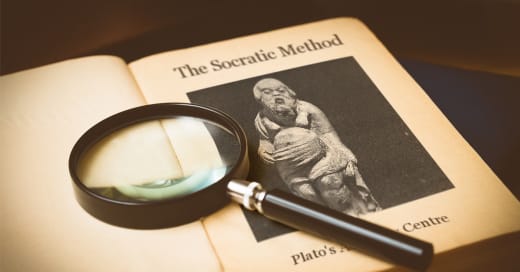This episode is the final part of the Plato’s Academy Centre course on the Socratic Method. In this lesson, we will be learning about the positive philosophy of Socrates and his use of irony. If you've enjoyed it, please check out these simple ways you can support the Plato's Academy Centre.
Socrates' fellow Athenians were frustrated and fascinated by him in equal measures. Right down to the present day, students of philosophy have shared a similar experience when reading Plato's dialogues. Socrates was a complex character. We'll conclude by discussing one of the enduring puzzles about him: his notorious profession of ignorance, which scholars call "Socratic irony".
Did Socrates Have Two Philosophies?
Socrates was well-known for claiming that he knew nothing, or at least nothing of much importance about the most important things in life.
He used to say that [...] he knew nothing except just the fact of his ignorance. – Diogenes Laertius
This aspect of his philosophy is clearly methodological – it helped Socrates to engage in his question and answer approach more freely. On the other hand, it doesn't seem entirely sincere, or entirely true, for him to say he knows nothing about such matters as wisdom and virtue.
Sometimes he merely hints at these beliefs but at other times he states them quite clearly.
Socrates often seems to have an agenda and to be working toward certain conclusions, which are often quite simple but paradoxical in nature. Sometimes he merely hints at these beliefs but at other times he states them quite clearly. For example:
For I go around doing nothing but persuading both young and old among you not to care for your body or your wealth in preference to or as strongly as for the best possible state of your soul, as I say to you: “Wealth does not bring about excellence, but excellence makes wealth and everything else good for men, both individually and collectively.” – Socrates in Plato's Apology, 30b
The Stoics focused on Socrates' positive doctrines about virtue ethics, viewing him as a predecessor of their own school of philosophy in this regard. By contrast, the ancient Greek philosophers known as Skeptics developed a system inspired by Socrates' methodological doubt. Although the Stoics and Skeptics were both influenced by him they chose to focus on different aspects of Socrates' teachings.
Socratic Irony
For the purposes of this short course, we'll focus on Socrates' claim to lack wisdom because it's characteristic of his question and answer style of reasoning. The name "Sophist", Sophistes in Greek, means "expert" or one who claims to possess wisdom. The Sophists claimed to be wise and virtuous, and they charged high fees for teaching wisdom and virtue to others. In contrast, Socrates refused to accept fees, casting himself more in the role of student than teacher.
I share the poverty of my fellow countrymen in this respect, and confess to my shame that I have no knowledge about virtue at all. – Socrates in Plato's Meno, 71b
Through his repeated disavowal of any special knowledge, Socrates is able to focus on asking questions. In a sense, that helps him to keep an open mind, as we would say today.
Plato says that ignorance may be divided into two sorts: "simple ignorance" and "double ignorance". Simple ignorance is less serious. Double ignorance "is accompanied by a conceit of wisdom; and he who is under the influence of the latter fancies that he knows all about matters of which he knows nothing" (Laws, 863cd). Socrates viewed his method as a cure for double ignorance.
The Socratic Method undermines the intellectual conceit, or double ignorance, of the person being questioned by exposing contradictions in their thinking. At the same time, though, the questioner is modelling awareness of his own ignorance. It's as though the questioner is demonstrating the benefit of having subjected himself to the Socratic Method – he or she now enjoys a kind of intellectual freedom.
Now you've completed the lessons, why not take our quiz on Facebook about the Socratic Method? If you think your friends would appreciate this course please share the link them.
















Share this post